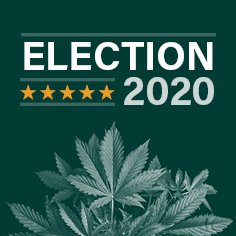Saphira Galoob is one of a handful of lobbyists in Washington DC who have been pushing federal marijuana reform efforts on behalf of businesses for several years. The client list of The Liaison Group, where Galoob is principal and CEO, includes multistate operator Acreage Holdings, the National Cannabis Roundtable and the California Cannabis Industry Association.
Marijuana Business Magazine caught up with Galoob to get her predictions on possible changes to federal cannabis law, depending on outcomes of the November election.
What do you expect to happen with federal marijuana reform if Democratic presidential nominee Joe Biden wins the White House and Democrats take control of both chambers of Congress?
I don’t think we would get legalization on the first day. If you look at what the Democratic platform has been, and where Biden has been both historically and recently, I think we get a return of a climate in the Department of Justice to the Obama era. So, a climate of nonenforcement.
There’s an uptick in audits by the IRS, and I think that quiets down a bit. And maybe even a reinstatement of a Cole Memo-type guidance—protections from interference for the industry. But I don’t think we get legalization right off the bat.
I do think the budget rider that protects the industry (from federal interference) will get addressed. But from the larger reform picture, I think the predictability is less certain.
The DNC platform very specifically rejected the idea of legalization—and even (marijuana reform advocate U.S. Rep.) Barbara Lee, for whatever reason, was in favor of that rejection.
The momentum that we see … may not manifest in the way folks are hoping for in the short run. It’s about what’s practical politically.
If the SAFE Banking Act doesn’t stay in the COVID package, that’s a piece of legislation that came out of the House and had the support of every Democrat, so I do think we get SAFE Banking earlier rather than later.
I think that adding (Kamala Harris to the ticket as his running mate) probably positions Biden to refine his platform.
The legalization of medical cannabis, that platform moves cannabis to Schedule 2. That doesn’t solve interstate commerce or 280E (tax law) or banking. The pathway is not straight. It’s very circuitous and complex. And while Sen. Harris was the Senate lead on the MORE Act, in terms of her walking into Congress, you should look at other things that would be top of mind.
If the reforms you mentioned did occur, how do you think that would transform the industry landscape? For instance, could interstate commerce become a reality?
Interstate commerce means the ability to drive California cannabis to Maine.
Let’s say California wants to sell its cannabis in Oklahoma: You could possibly drive through the states, but it doesn’t mean you’re going to be able to sell your California cannabis in Oklahoma unless Oklahoma wants California to be able to sell its cannabis.
So I think we need to be very precise about what we mean by the concept of interstate commerce. Can we traverse states legally? Or what’s the paradigm by which California can sell its cannabis in any state?
I don’t envision a scenario in which states are going to relinquish their oversight or their regulations of the sale and distribution of cannabis. Now, it may be that some states decide they prefer that California marijuana be sold in their state, but maybe they don’t want to undermine the existing state paradigm trajectory by allowing that.
What do you expect to happen if Trump wins reelection and the GOP keeps the Senate?
The very worst-case scenario for cannabis is if Republicans hold the Senate and (Colorado’s Republican incumbent U.S. Sen.) Cory Gardner does not return. That would be an absolutely abysmal situation for us because he has been the champion in terms of educating, socializing and familiarizing; he really understands how to talk cannabis to conservatives.
The other thing that happens is if (Kentucky Republican and Senate Majority Leader Mitch) McConnell holds the Senate: There’s anticipated to be a big change in committee chairs. The stance of noninterference likely continues—but based on the way Attorney General (William) Barr acted earlier this year, there’s probably going to be increased scrutiny and audits by the IRS. And it’s pretty well known that companies are starting to experience that uptick already.
There is one silver lining: We’re going to see several more states probably do something with cannabis (via state legalization ballot measures). All of this can add to the pressure points on reconciling federal and state laws.
What are the biggest obstacles to federal reform efforts?
For the Republicans, it’s a combination of education, awareness, fear and what their constituencies demand. A perfect example is Oklahoma: (U.S. Sen. James) Lankford is a bit of an outlier, but (U.S. Rep.) Tom Cole voted for SAFE Banking.
For the Democrats, it’s more a combination of priority and incremental versus comprehensive (reform). I think there’s a misnomer that all Democrats want full legalization tomorrow. There are a lot of moderate Democrats. A lot of them saw how the regulation of opioids was wrong on their watch, and they’re just not 100% sure, which is why you have Biden and the Democrats’ platform taking a more moderate approach.
What’s your prediction for when federal legalization will happen?
It depends on what you mean by federal legalization. If you’re looking at whether use, possession and distribution is no longer a crime, if Biden is elected, I think it’s very early on.
If you’re looking at a system in which federal agencies are engaged in oversight and have standards that maintain safe access and use, the amount of time it takes to do the rulemaking can be a multiyear process.
If we’re looking at a states’ rights approach, you may be able to address some of the immediate pain points, such as 280E, quickly. It really depends on what the word “legalization” means.
This interview has been edited for length and clarity.




